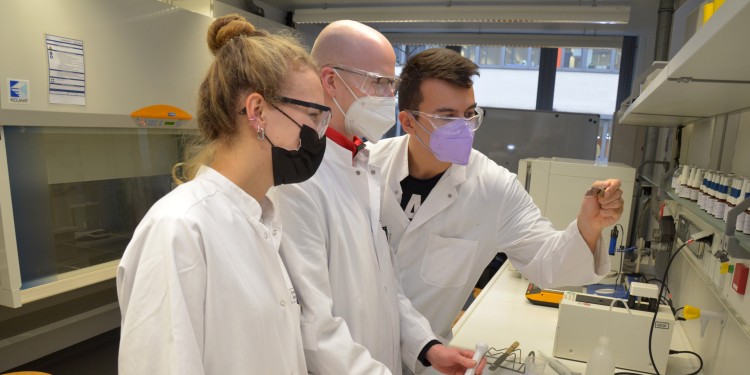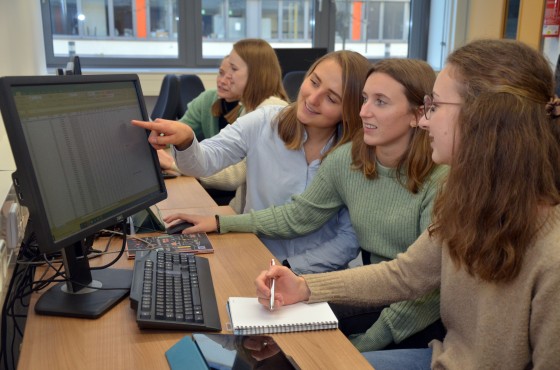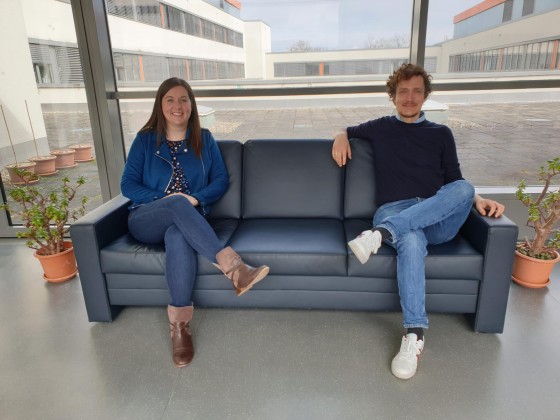
A pioneer of innovative training
Can therapeutic plasters help to combat depression? What impact does the high amount of pressure to achieve good marks in studying pharmacy have on students’ mental health? Does an antibiotic gel have greater benefits than tablets in treating wounds? It is not easy to find answers to these questions, and doing so requires creativity, a researcher’s approach, and interdisciplinary thinking. Nevertheless, the motivation displayed by pharmacy students at the University of Münster is high. Thanks to the “PharMSchool”, they are able to undertake independent research into a scientific topic. “What I especially like is the fact that we can try out so many different things,” says Charlotta Struncius, who, together with six fellow-students, is studying what is nowadays a widespread illness: depression.
It is exactly ten years ago that the University of Münster’s PharMSchool started up. Since then, it has evolved into a lighthouse project for interdisciplinary, networked teaching. “The PharMSchool increases students’ curiosity to know more, as well as promoting the idea of learning through research and strengthening networking between the fields pharmacy comprises: chemistry, biology, technology, pharmacology and clinical pharmacy,” explains Dr. Frauke Weber, who, together with Dr. Stefan Esch, acts as Coordinator for the PharMSchool and has been involved right from the start. The licensing regulations for pharmacists prescribe a defined structure for studying pharmacy in Germany. Before the PharMSchool got started, students had to enrol in compulsory courses which had no great points of reference between individual subdisciplines. “As a result, networking knowledge about medicinal products, looking farther afield, didn’t happen very much,” says Weber.
The PharMSchool fundamentally changed all that. In their fifth semester, as they begin the main part of their studies, students form small groups and are assigned a topic relating to medicinal products which they work on up to their eighth semester, for example during practical training sessions in a laboratory. Their task is to examine various aspects of pharmaceutical science from the different angles presented by the subdisciplines and then conflate them.

“Looking back,” says Stefan Esch, “the PharMSchool is a real gain for Münster.” Besides teaching specialist competences, he says, the project also reinforces soft skills such as problem-orientated working, interdisciplinary thinking, initiative, communication skills and teamwork. “We notice a different kind of self-confidence, for example when the students have to give presentations. The students identify more strongly with the results of their work, outside the PharMSchool too, and they tackle problems in a different way.”

One thing all PharMSchool projects have in common is the fact that they are presented to a broad range of specialists in a symposium held at the end of the eighth semester. Mentors from among the group of university teachers provide support for the students during their entire time at the PharMSchool. And although earlier funding has now expired, the five pharmaceutical institutes at Münster University are continuing to provide support for the PharMSchool – which has already been awarded not only the Rectorate’s Teaching Prize but also numerous other forms of financial support. During the Corona pandemic, new teaching methods and digital tools were introduced to the PharMSchool, offering both teachers and students even more flexibility and opportunities. “We want to get away from ‘compartmentalised learning’,” says Frauke Weber. This is something those involved have admirably succeeded in doing.
Author: Julia Harth
This article was first published in the University newspaper “wissen|leben” No. 8, 21 December 2022.
